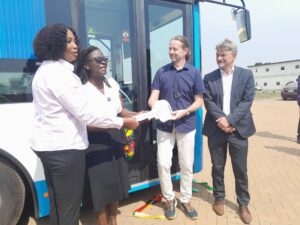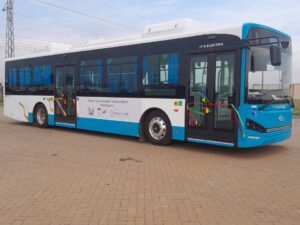GIZ presents an electric bus to the Ghana Free Zones Board
 The Deutsche Gesellschaft für Internationale Zusammenarbeit (GIZ) has presented a 58-seater electric bus to the Ghana Free Zones Authority to aid the easy mobility of employees within the Tema Export Processing Zone (Tema free zone enclave).
The Deutsche Gesellschaft für Internationale Zusammenarbeit (GIZ) has presented a 58-seater electric bus to the Ghana Free Zones Authority to aid the easy mobility of employees within the Tema Export Processing Zone (Tema free zone enclave).
The presentation is supported by ‘Invest for Jobs’, an initiative of the German Federal Ministry for Economic Cooperation, implemented by GIZ.
Mr. Dirk Aβmann, the Country Director, GIZ Ghana, handing over the bus, said the launch of the electric bus was consistent with their goal of creating a cleaner and more sustainable environment, adding that they hoped it would increase the demand for and share of green energy in the energy matrix in Ghana.
Mr. Aβmann added that it was their wish that the bus would facilitate the movement of workers and visitors to the industrial park, indicating that the initiative would be up-scaled in the coming years as the government of Ghana had shown commitment to promoting e-mobility during the reading of the 2024 budget.
He said the initiative did not only represent the efforts towards a more environmentally responsible and sustainable form of transportation but also the dedication to a better, cleaner future that goes together with the significant industrialization and the creation of decent jobs that they sought to achieve.
Madam Kate Abbeo, the Deputy Chief Executive Officer of the Ghana Free Zones Board, in charge of Finance and Administration, said the bus initiative came out of a GIZ-commissioned study in the enclave, which recommended, among other things, the need to get a bus to convey employees to the various companies in the enclave.
Mrs. Abbeo commended the GIZ for the partnership and initiative, saying it was profound for a development partner to roll out interventions based on empirical evidence.
 She said the Tema Export Processing Zone (Tema Free Zone Enclave) currently has 75 enterprises operating from the 1,200-acre enclave, with over 10,000 employees transporting themselves to work in their respective factories; therefore, such an infrastructure was key for a conducive work environment.
She said the Tema Export Processing Zone (Tema Free Zone Enclave) currently has 75 enterprises operating from the 1,200-acre enclave, with over 10,000 employees transporting themselves to work in their respective factories; therefore, such an infrastructure was key for a conducive work environment.
She said it would provide eco-friendly and affordable transportation for the workers to the factories compared to the private means of transportation from the entrance of the enclave to the institutions.
She said other challenges in the enclave that needed some attention were the availability of enough street lights, preferable solar-powered ones, waste treatment from the various companies before being discharged into the existing waste stabilisation pump, and a suitable parking place for haulage trucks.
Mr. Richard Kwame Frimpong, a representative of LMI Holdings, a development partner of the Ghana Free Zones Board, said his outfit builds infrastructure to support industrialization.
Mr. Frimpong noted that they work as both developers and operators in the free zones and are currently operating about 700 acres of the enclave, adding that their aim is to make the industrial park sustainable and friendly for investors.
Mrs. Patience Agbleze Acorlor, the Director of the Tema Administrative Office of the Ghana Free Zones Authority, welcoming the visitors, said that as part of the recommendations of the GIZ survey, her outfit had trained 1,7000 people in the enclave on time management, occupational hazards, and trade facilitation, among others.
Mrs. Acorlor stated that the second recommendation of the need for the provision of a canteen for the workers to get affordable meals was under way as an existing building was renovated for that purpose.
On the management of the bus, he said a park has been created at the entrance of the enclave for it to operate from, adding that her outfit would, in the meantime, manage its operations.
Source: GNA
